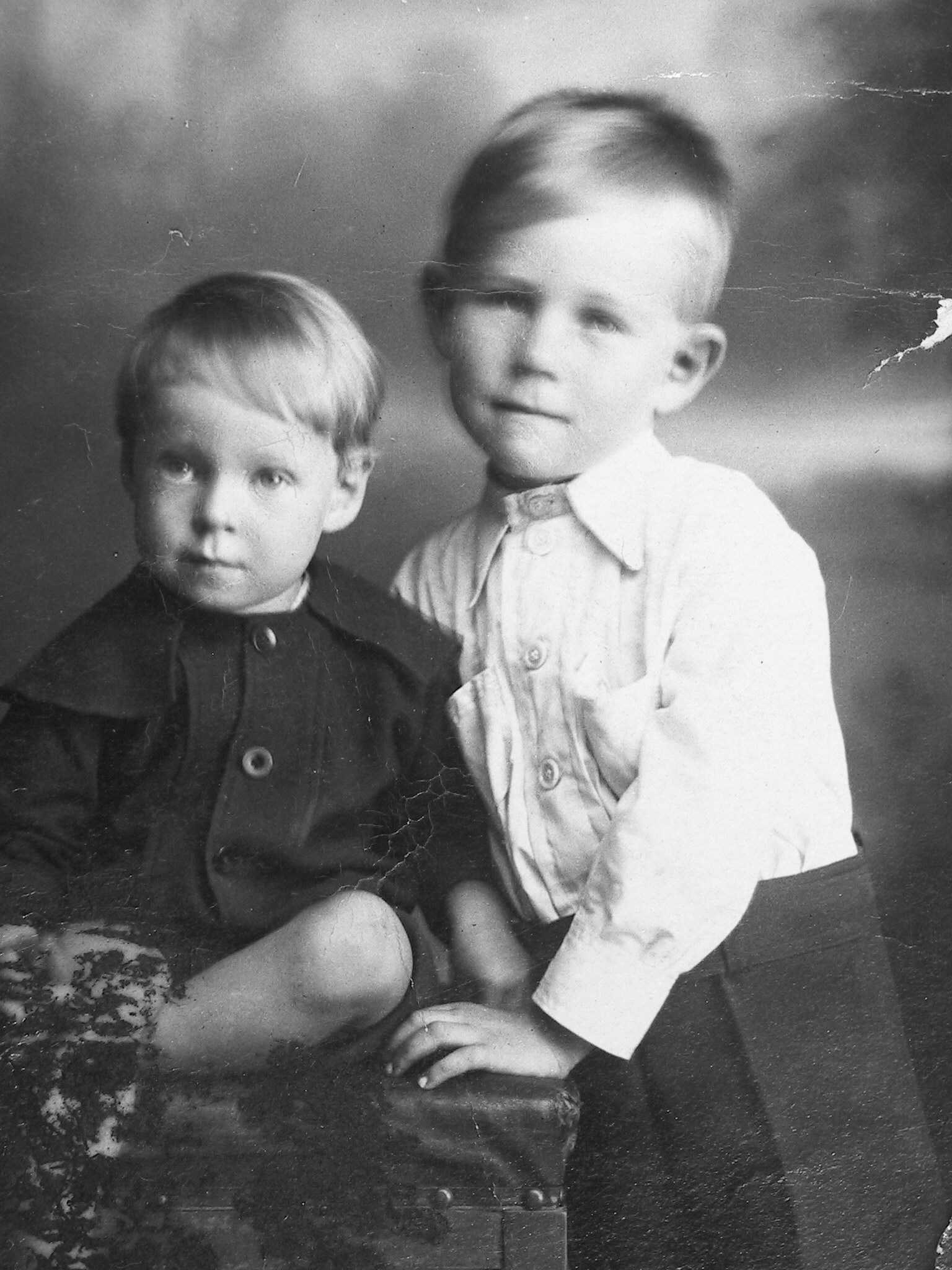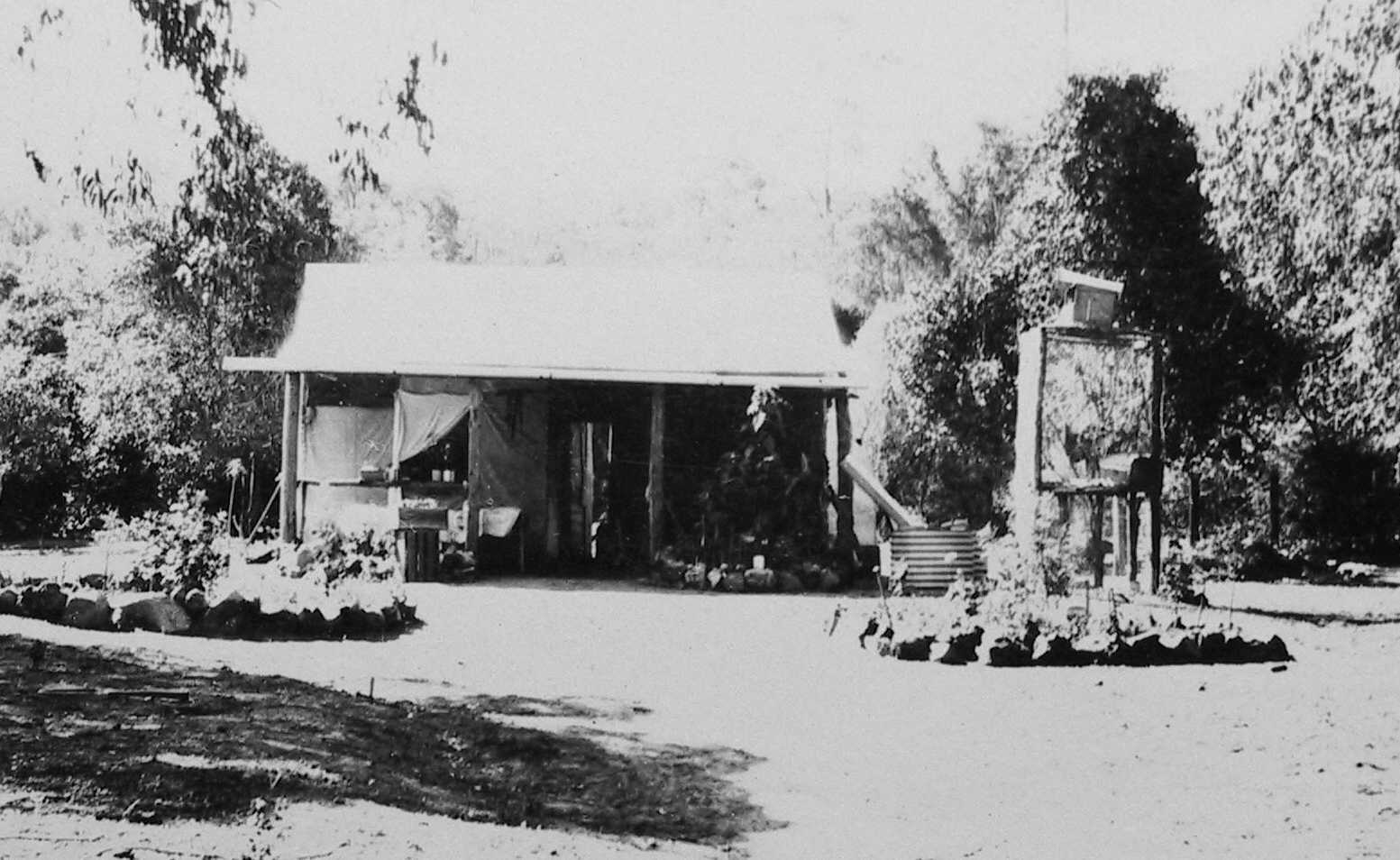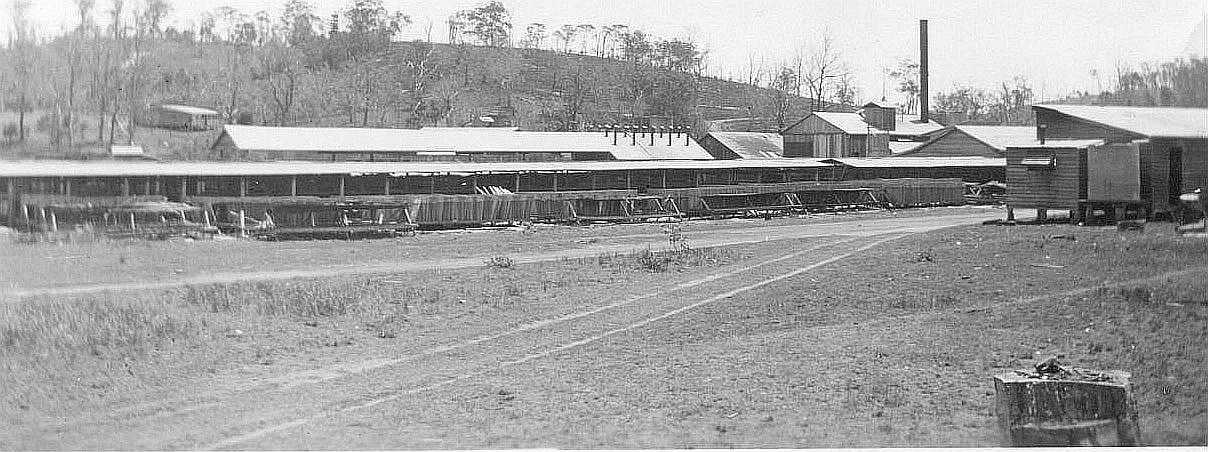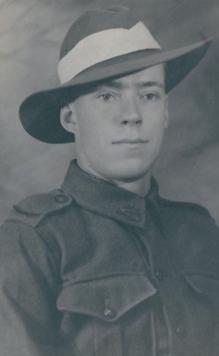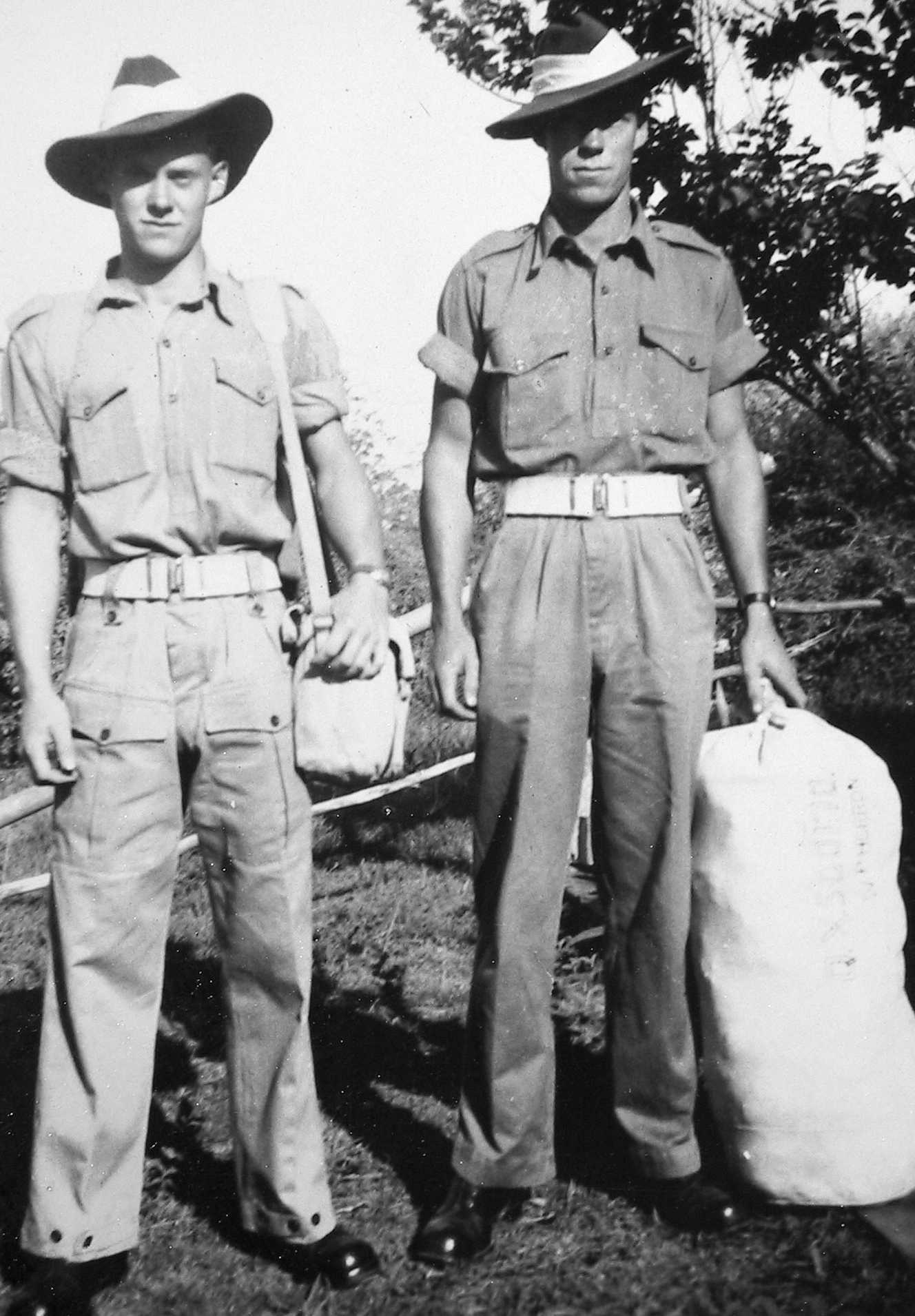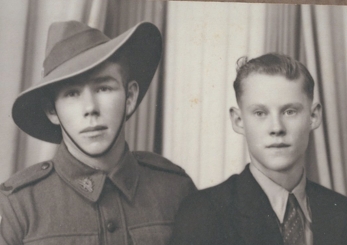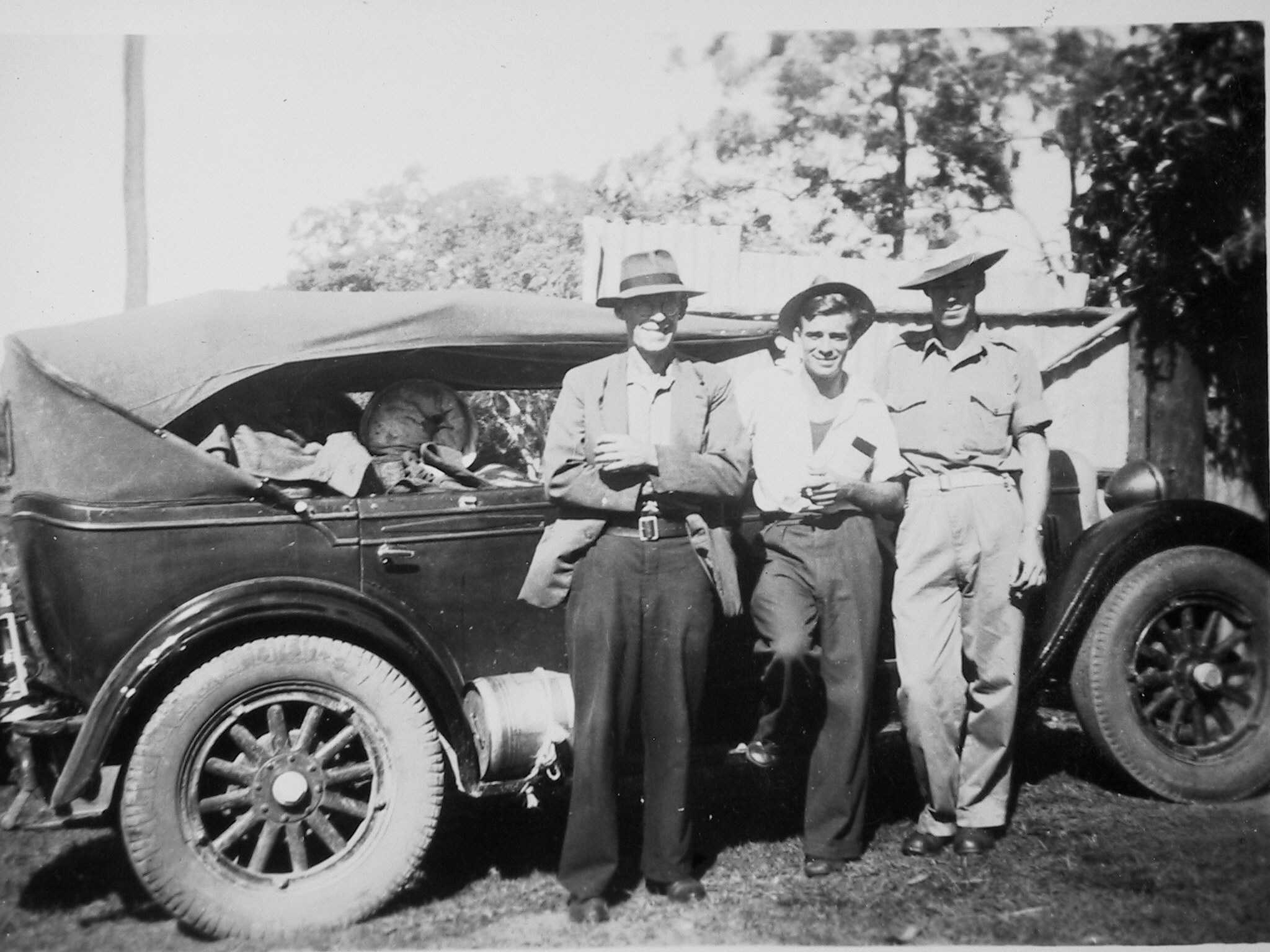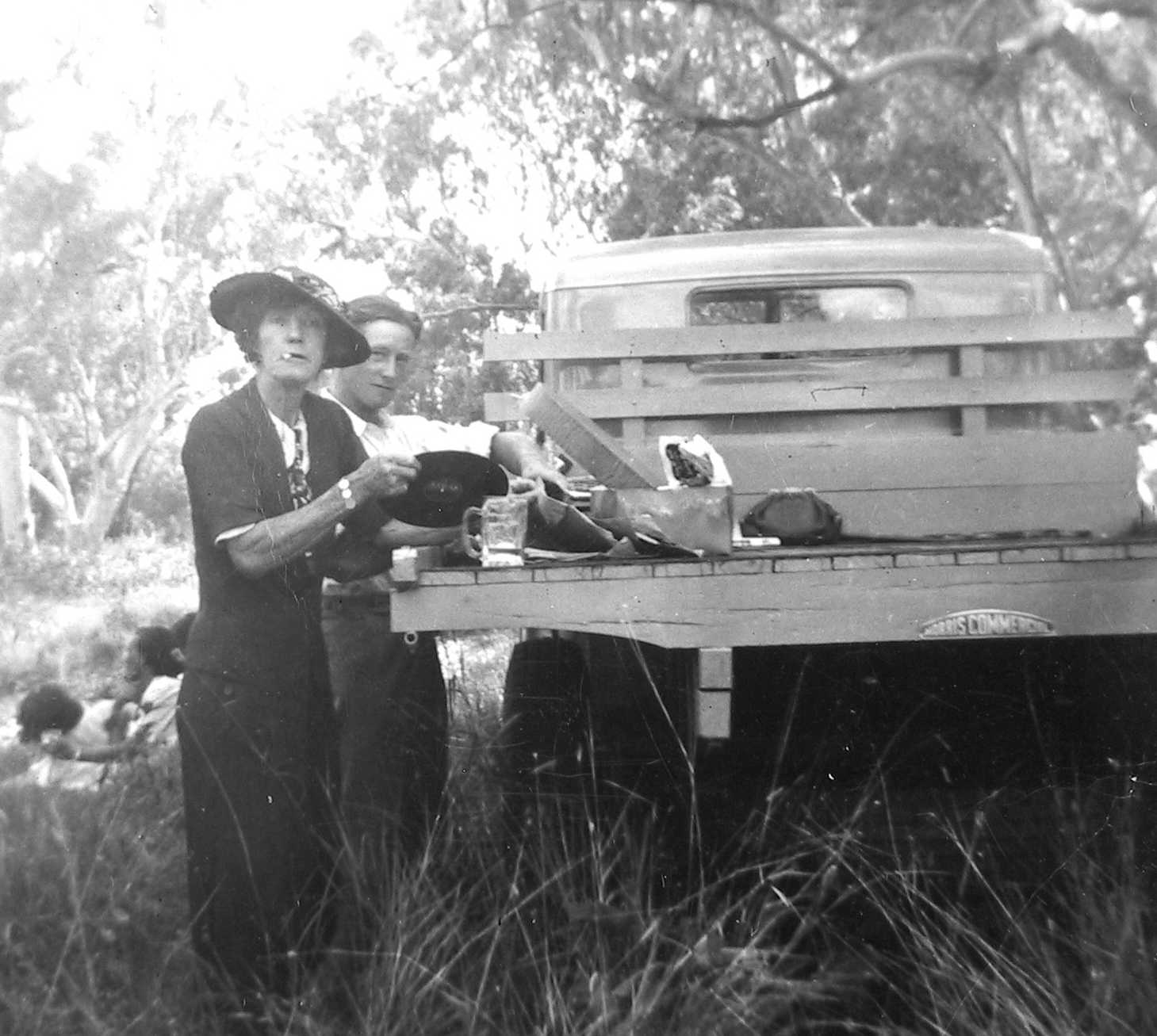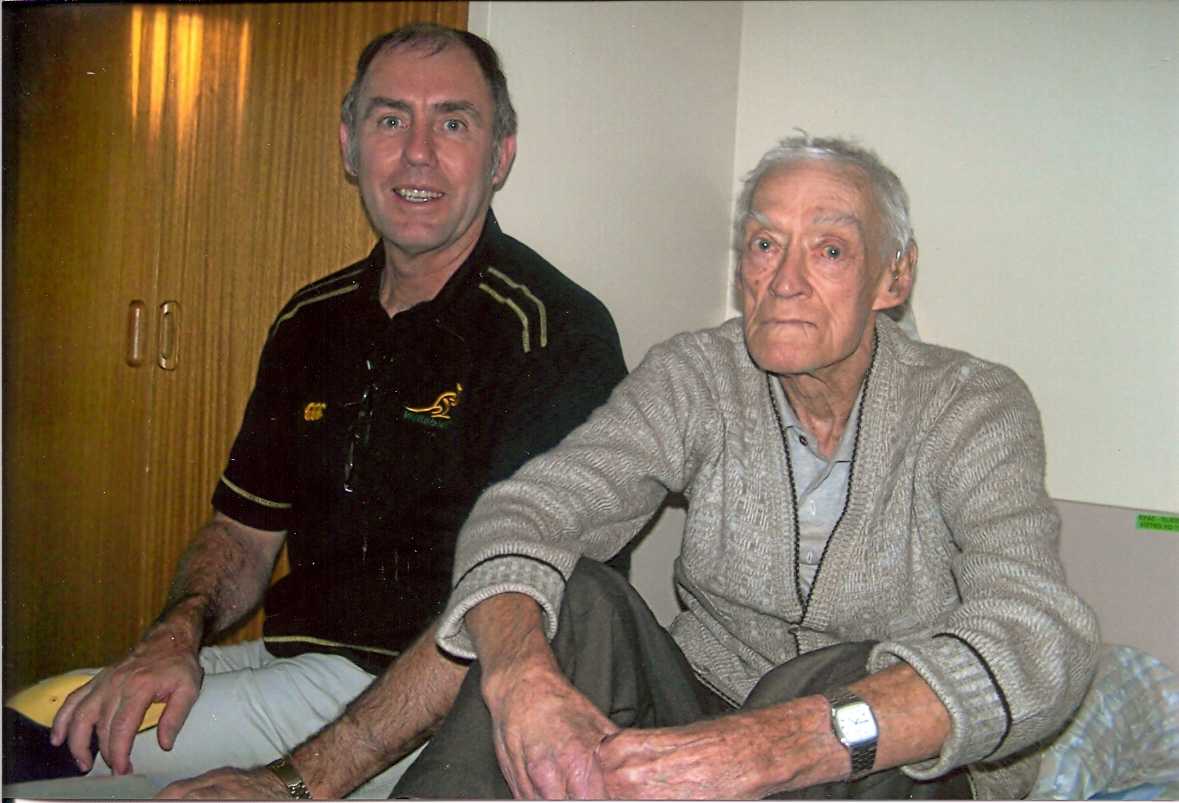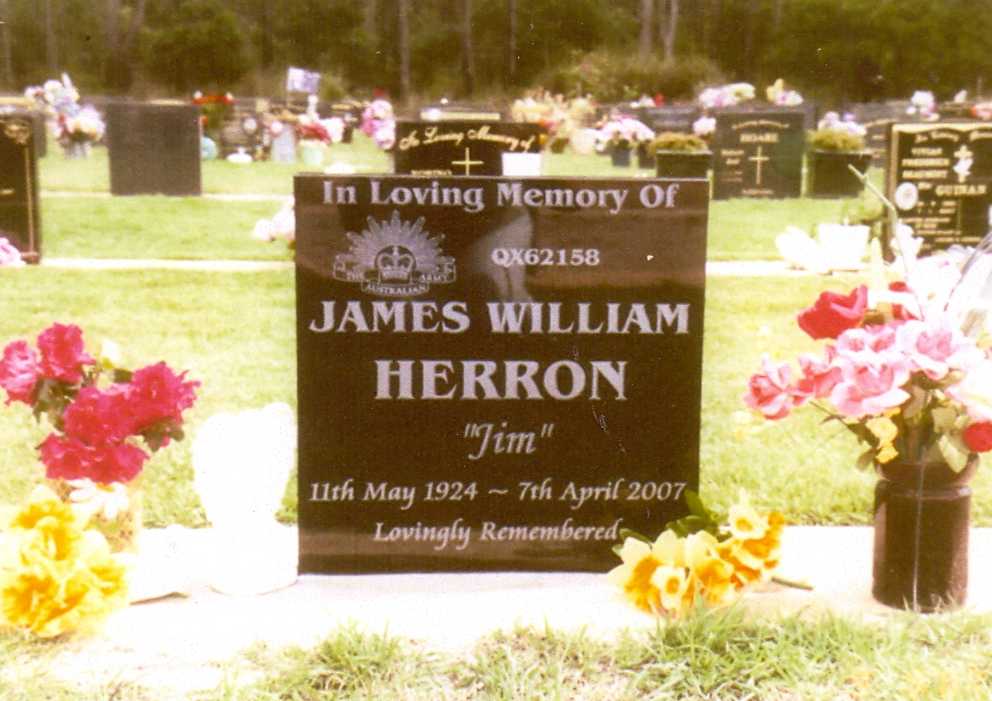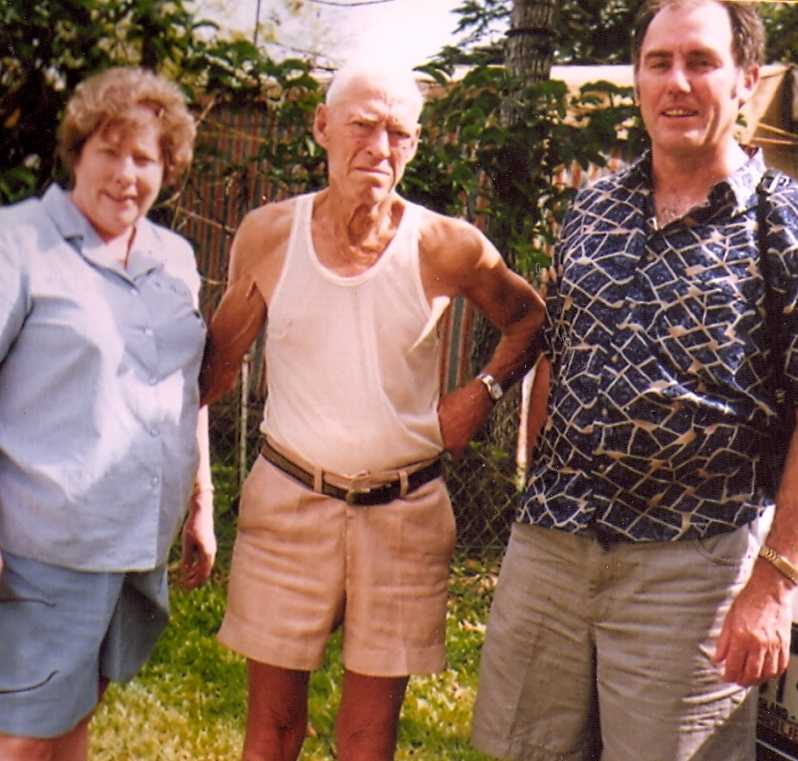7.b.1.3.4 James William Herron
James William Herron Born 11th May 1924 died on 7th April 2007
These are excerpts from an interview with Jim Herron.
They cover parts of his childhood around Roma in the late 1920’s - early 1930’s.
James William Herron: His Story: As told to his nephew John.
The old homestead: “Yeh, the old man built every stick of that - there’s not a stick of sawn timber in that - everything cut and he smoothed all the timber with the old adze. The structure on the right at the front: That was built as a bird cage built around a tree stump - sometimes we had birds in it and in the last possum season we had up to 40 odd possums in there - we snared the possums to get the skins and the joeys that was old enough to live - we’d rear them up in there until they were fully grown and let them go.
The house had two rooms. The kitchen and that was up this end (right hand side) and that end was more or less the bedroom (on lhs) and us kids our beds were out here under the lean-to. It was cold in winter but didn’t feel it much there. And that little tank that was the only water (for drinking). There was a dam out from the left hand side about a quarter of a mile. Had one of those tanks on a old forky log slide and used to cart water over to old mother’s garden. Cart water a couple of times a week and water the garden - job done by all us kids - we all had to help in that.
In that area over here (not sure which side - john) the old man had a paling fence around the place and out here he had an area there ( about 8 metres square) he built that with ten foot palings. We used to have to shut the goats up in there every night. When we left there the dingoes had a pad about 15 inches deep from walking around the outside of it. We had the best part of a hundred goats. Old mother used to milk the goats and make cheese and butter for us - not for sale. The nearest neighbour was about nine mile away. There was no motor cars in those days - horse and sulky.
Dingoes: Hidden Springs eastern boundary is the Dingo Proof Fence - so the property is in dingo country and they are everywhere - healthy dogs, diseased dogs, mangy dogs - but in the old days the fence did not exist and they were everywhere.
Dale forgot to shut the gate one night. Sometimes you wouldn’t be able to find - there’d be some of the goats - a couple of goats strayed off from the mob - generally you’d never see them again. The dingoes would even get amongst them in the daytime. It would be nothing to go out in the bush and see 12-15 dingoes in a pack.
(Dale recounted this story many times when he had dementia, it obviously had a great impact on his early life)
We had an old kelpie dog. She used to sleep under the lean-to. The dingoes would come up during the night and play with her. The night the gate was left open - you’d know there was a dingo amongst the goats because every goat would be bellowing its head off. That night - once a goat started - well the old man jumped up and raced over - and of course the dogs took off once they’d seen him.
To go to town and back was an all day affair by buggy or horseback. The nearest main town was Gunnewin - Injune was only a siding. Now Gunnewin is only a locality - everything other than the hall is gone. It had a store, post office, police station, doctor, hotel/s - the lot.
Anyhow, one night the old mother was driving the buggy and us boys were in the back absolutely terrified because the old mother kept warning us not to fall off or the dingoes would eat us as they were hungry. Anyway, as they got closer to the buggy every now and then the old mother would fire the old windchester at them. But they were that cunning as soon as they saw her pick up the rifle and cock it they would melt into the scrub - but still shadow us. Boy were we scared of those dingoes.
One afternoon there was a big storm. The biggest block of ice I’ve ever seen in a storm - Dale and I and Wilf were all standing in the front door of the place and looking out and this block of ice - oh it would be twice the size of that (an A3 sheet) landed about 3 metres from the front of the house and we raced out after it and picked up pieces that broke up - about the size across both hands. And old mother came home in the middle of the storm - she went over to help an old bloke milk his cows - he was crook - and she come home when the storm come up - rode home through the … Bombalass(?? Mare’s name maybe ) - a white arab mare - and the mare was all red spots where the hail had drew blood on her.
The old man had built her a chicken coop - for old mother. Oh it would be about four foot wide and about eight foot - ten foot - long and about three foot high. In the middle of the storm - had about 16 chooks in it - young roosters - and the storm just picked it up and they’re floating across - I can still see it - feathers going everywhere. Course they didn’t survive.
I think Valerie and Dale’s father (Claude Annesley) originally came from New Zealand. I don’t know what Claude Annesley done for a living or anything.
The Jillett’s came out to Australia and took up country around Tambo. Old mother’s father was the senior partner. They owned Greendale station, maybe Tambo station and Chattam station to my knowledge.
Wilf and my father (Samuel James Herron), and my mother, were never married.
Samuel James was one of six children of an Irish father - James Samuel Herron - and a Scottish mother. The children were Florence, George, Samuel James, Margaret, Grace and William.
The grandfather (James Samuel Herron), he came out from England and he was a chef/cook and a butcher by trade. After they came out here they sort of ended up with a bit of a farm outside Roma - before that he was a shearers cook. Used to go out around Winton and everywhere cooking for shearers.
He was a chef and in England they used to make all these fancy sausages, black puddings and all that sort of stuff. I don’t know what happened just after they came here to Australia but that's where he ended up. He was married when he came out here - I don’t know too much about them - I only met him and the old grandmother about a half a dozen times - they used to live in Stones Corner in Brisbane. They lived with their older son George Herron.
The following information was found on the 5th Light Horse site on the internet re George Herron.
Private George Knight HERRON - No. 2190 Joined the 5th Light Horse Regiment at age 25 - Presbyterian, Single, Stockrider of Roma Queensland. Next of Kin: James Herron of Yingerbay near Roma Queensland.
Transferred to 15 Bn, 16 Oct 1916.
So far as I know dad was born in Roma. (Dad was Samuel James Herron but was called Jim). But he hardly ever went to school because his father was a shearers’ cook and in them days it was nearly always blade shearing (circa 1900) and old Jim Herron he used to take my father with him as an offsider so he only went to school for about six months of his life. But he was a pretty smart old bugger - there was nothing he couldn’t do.
Dad had three sisters. Florence was the oldest one - she married Nat Stephenson
Then Grace who married Bob MacGregor - her son (Noel MacGregor) runs sideshows up and down the coast. Maggie, who married Cronje Stephenson (brother of Nat).
Wilf was born in 1927. I was three years younger than Dale and Wilf was three years younger than me. And Dale was three years younger than Valerie. (that's five years I think - Valerie was born in 1916)
Us three boys were always together. The only one we didn’t have time with was Valerie. We heard of her again in 1938 - she came down from up around Charters Towers. She was droving.
Claude and Katie were never divorced. They just split up - I don’t know what they split up about. My old mother never talked about it. All I could find out - when they split up he took the baby and went up north to Cairns/ Townsville somewhere.
Valerie would have been only about three. (It must have been 1921 so Val would have been five- ).
I don’t know whether he just cleared out with the baby and the old mother didn’t have any money to chase him. The first I knew was that Valerie was married with a couple of kids - old mother found out some way and made contact with her and she came down to us at Goomeri - we were farming there at Goomeri when she come down - that was about 1938. I never ever found out much about Valerie.
Valerie married this bloke - his father had a property up around Penton - Gordon Foster.
When Claude Annesley left - I don’t know whether they were in Roma or Brisbane at that time when the mother and him split up. She came out there - a lot of those soldier settlement blocks were being opened up then. She came out there - I don’t know whether she put in for a block or what.
Anyhow she arrived out there somehow and so far as I know when Claude and old mother split up she was already pregnant - she was pregnant when her and my old man met up (that should have been 1921 - unless there was another pregnancy in there in 1923 and the baby was stillborn or given for adoption).
And so when Dale was born (this implies 1921) they were already living together and that's all they ever did - they never bothered getting a divorce or married themselves.
I don’t know what she was doing in them days - she could have been living in Roma with old granny Ricketts - an old dark lady who used to have a boarding house in Roma. Her and my old mother were great friends. Old mother was very independent - very bad tempered woman when she wanted to be.
I don’t know how old mother took up with the old man. The old man had been contract fencing ‘round Roma, and Mitchell and Charleville and down as far as Quilpie and that - and this property Hidden Springs come on the market for the rates that were owing on it - about 600 pounds.
Anyway the old man had saved up enough money and he’d bought it. He bought the property - it had no stock or anything on it and when he moved out there to build the hut on it I think that is when he met up with old mother.
The old man got goats on Hidden Springs to have a bit of meat for us kids and he struck about six years straight drought. And he could never get enough - he was out working for others for a pound a week most of the time - just paying the rates. He never had money to buy stock of his own to put on it.
And in the finish the drought broke him - he walked off it for 25 dairy cows and fifty pounds. Sold it to a bloke by the name of Archie Laycock. And then we moved into Orallo - he rented a dairy farm off of Archie Laycock(??). Orallo was about half way to Roma from Gunnewin.
Old Jim was like everybody else - everybody killed other peoples stock in them days. You never killed your own beast in them days. The only time you ever got a feed was when you used to say - “I’m going to so-and-so’s for dinner tonight - at least I’ll get a feed of my own beef.” Sometimes you got caught knocking off things - very seldom though.
Generally you had the bush telegraph to let them know when the police were heading their way. It was all horses in those days - no motor cars. It would take the policeman all day to ride 30 miles - by the time he got there, there would be nothing left. You just took the evidence away somewhere and hid it in the bush. They always had trackers - but the trackers would generally be in with the other side.
I’ve seen the coppers ride - well it was 30 miles from Gunnewin - well from Injune - to the old man’s place - I’ve seen two coppers and a tracker ride out there - get there at bloody one or two o’clock in the afternoon - and nothing to be seen.
And anyhow, the old man said “oh well you fellows might as well stay for dinner before you head back to town.” Well the old seargeant’d say “Yeh! thanks Jim”. Anyhow, they sat down and the old man said “the wife's got a bloody kangaroo stew on.” So they sat down and they had two helpings these two coppers - and the old tracker he’s got a grin on his face. So they had two helpings of this kangaroo stew and the sergeant said “that was a bloody good stew Mrs Herron - bloody good stew Kit (everyone calls old mother Kit).
“Oh yeh!” she said. “Bloody goat meat and kangaroo - its all meat”. They said “oh well, we’d better head home now.” So they’re walking out and this young copper looks up - the old man had forgotten that he’d hung the bloody liver up under the lean-to of that old hut. He’d put it up there for the dogs.
Anyhow, this young copper looks up and he said “that's liver!”. The old man said “Of course its bloody liver - haven’t you ever seen a liver before?” The copper said “yeh! It looks a bit dark”. It’d been hanging there all night and all day.
The old man says “of course - haven’t you seen bloody goats liver before - its always dark.” The old sage - and this tracker is going like this (holding his mouth closed) trying to stop himself from laughing. The old sage says “pretty big for a goats liver!” The old man says “oh, we've got pretty big goats out here.”
So away they went. They’d eaten the beef for dinner that they were looking for. They’d ridden out all day - and had midday lunch (one or two o’clock) - and it would be late when they got home. It was a bit dangerous for them - probably not so much bushrangers - but a lot of cattle duffers. Especially if they came poking around your place looking for evidence of your killing about ten o’clock at night. I’ve seen that happen out there too!
The old man would kill - and he’d bought a few beasts just for killing purposes. And he killed one of his own - he wanted to send the hide away. See he used to make all his own harnesses. And he’d send the hide away - salt it and roll it up and send it away to be tanned.
He’d send it to the tannery - they’d tan it and send him back half the hide and the’d keep the other half as payment. And he’d killed this beast late - he killed just on dark and threw the hide up over the rail and going to salt it down the next morning. And anyhow, about ten o’clock that night - this bloke Hedley Wells that was staying at home went outside for a leak and he said to the old man “hey! come out here. There’s some bastard down there at your yard.”
The yards were about three hundred yards away. The old man went out and had a look and Hedley said “I’ll shift these bastards - that’ll be that bloody neighbour of yours and the coppers.” He said to the old man “grab your rifle.” So the old man pulled this old 38/40 off the wall - and this Hedley Wells he had a bloody old 303 - he was a roo shooter and everything. Went out and the old man said “well we’d better fire in the air.” This Hedley said “there’s a cigarette glow down there and the next time he draws it and it glows I’m shooting straight at the bloody thing.”
The old man fired the old 38 - it was like a cannon going off up there in the mountains -fired it in the air and this Hedley let fly. Well old mother and us kids had just put in a new plain wire fence - four plain wires. It was steel Neptune wire - you could play a tune on it it was strained that tight. They busted two of them wires - because they had to get through there to their horses to get out onto the road to Gunnewin.
This Bill Armitage used to have a pack horse mail. He was in Gunnewin in the store getting the mail next morning - of course he’d heard about it - about the coppers being out at Herrons. And the old Seargeant walks into the store at Gunnewin.
Old Bill Armitage was an old pom - he’d been out here since before the first war. And he said “oi! I believe you went out to Herrons place last night sargeant.” The sargeant said “yeh and its the bloody last time well go out there.
Them bastards will shoot you out there.” And old Bill said “old Jim wouldn’t shoot you.” “Ah, I don’t know. I was sitting - you know that old iron bark tree alongside the yard?” Bill said “Yeh!”. “
Well I was sitting down at the butt of that having a smoke and you can go out there and have a look now. There’s a bit of timber there that long (two foot) and that wide (a foot) where the bullet hit and tore off the side of that tree and it was about that far (six inches) above my head.” I never seen them come out there again. That was the last time they came to the old man’s place.
“Poddy dodging”. The old man was in on it too! He and this Hedley Wells and this Hardgreaves (a neighbour) had a mob of poddies - oh, I suppose twenty or thirty - we had them up in a gorge in the foot of the mountains. The old man and Wells were giving him a hand - and they got word that the coppers were on the way out. So this Hedley Wells said to Hardgreaves and the old man “you fellows stay here - I’ll give these blokes the run around - better get those cattle back up into the scrub.”
Anyhow, he goes out and when he sees them coming - see em about half a mile away - he sees the dust - they set off - go round in a big circle. The bloody tracker knew something was going on. They’re riding along - the tracker says “Hey! lookim boss - horse been here”. “How long?” “Oh, one-two hour.”
“Hah! We get em this time.” So they set off - round and looking on the ground - you know just riding. So they go round in this circle and come back. And this tracker says “Oh, bigfella mob now boss- look two times” - twice as many tracks. “We’re catching up on them now” - so away they go and do another circuit and when there coming around and there’s more tracks this old sargeant woke up then - he said “the bastards have tricked us again.”
The coppers weren’t too bright. A bloody lot of them couldn’t care less. But they’d get a report and they’d have to go out to make it look good for themselves. You could hide up there forever in the those foothills of the Canarvon Ranges - nobody would ever find you.
On that Hidden Springs - three mile up the range there was a big plateau of flat country - about three and a half thousand acres of just flat country - but there was only one way up to it. The bridle track meant you could ride a horse up to it - and there was only the one way down. They cleared tracks up there later on - and when motor cars come in they ended up building a four wheel drive track up there for tourists. In those days you were flat out walking up the bloody track.
There was a lot of people didn’t even know there was a spring on Hidden Springs. Well up in the mountains there was a spring and you know that roly-poly grass - there was a gully - oh! the gully would only be twelve or fifteen foot wide where the spring used to run down out of the side of the mountains and this roly-poly grass used to blow over it and the cattle would go in about half a mile down the creek and walk up to where the water hole was - drink and then go out that way.
If you didn’t know you’d ride a bloody horse in and just think “oh yeh its grass” but it would be a drop of anything up to twenty feet. that's how the old man called it Hidden Springs. So there was plenty of water up there but you’d have to be a mountain goat to get to it.
Dale and me and Wilf, its a wonder us bloody kids weren’t killed - from the time that photo was taken at about four years.
We used to climb all over that mountain. That hut - you go about two hundred and fifty - three hundred yards behind that hut
and the mountain goes up like that (steep). And we used to get up there and roll stones - oh bloody rocks half the size of that caravan
- be a nice round looking rock. We’d get sticks - we’d sit there - might take us a week - go up every day sitting in front of it digging it out.
Always think now if one of them bloody big rocks had let go - we’d a been killed - they’d never found us. We never used to think of that.
The box brownie camera was Dale’s. Our old man, old “Jim” Herron went to Roma once from Hidden Springs out at Gunnewin
and he come home and he give Dale that camera for a birthday present or a Christmas present or something.
We never went to school - thirty mile to the nearest school. Didn’t have motor cars - only horses
in them days. Ride thirty mile in the morning and back again at night there’d be no time for school.
So I never went to school.
I was over ten - about ten and a half years old when I first went to school.
So we dug these rocks out and roll them down the side of the mountain - go shooting - snare
wallabies. Dale and I were running about seven hundred wallaby snares every morning there
sometimes. Take the skins out and dry them - old man used to send them down to Fenwicks in Brisbane in them days.
It was our main source of income - and food. We’d bring a couple of fresh wallabies home of a morning - old mother would take the hind quarters and loins off and feed the rest to the dogs. Had three or four dogs and old mother was a cat lover - she generally had half a dozen cats. And she’d boil it up for the chooks. Anything up to a couple of hundred chooks running around wild in the scrub.
We’d snare the wallabies but we were all very good shots. We’d put a .22 shell end on - we used to just drive it into the bark of a pine tree. If you stepped back ten yards - ten long strides - and if you couldn’t hit the end of that 22 shell twice out of three shots there was something wrong - you were having a bad day. Everyone shot at this level. At about ten yards we used to put those old time wax matches - stick them in a pine melon and light them with a .22. We never loaded our own shells - the old man used to buy ten or fifteen boxes of cartridges at a time from the store in Roma - I think they were only about sixpence a box. They’d probably be about ten dollars a box now if you could get them.
Gold! One day Dale and I were coming back out of the gully behind the house when Dale picked up a gold nugget about the size of your thumbnail. We knew what it was and raced down to the old man who was talking with some men at the mustering yards. The old man said “give us a look at it, boy” and as Dale passed it to him he dropped it. Do you know we looked for that nugget for weeks and never found it. (possibly it could have been picked up by one of the outsiders). The old man scratched around up where Dale found the nugget but never found a trace of any more.
The Moreton Bay Figs. Everyone who came to Hidden Springs usually carried guns and as part of the entertainment they used to shoot at the trees. The trunks of those trees are full of assorted calibre bullets - everything from pea rifles to .303 and Windchester 38/40’s and possibly black powder cartridges.
Horses! The mother always had bloody horses. A couple of race horses. Old mother had one of the best race mares that was ever in that country. A pure arab mare - old Milwaukee. Started her thirty three times - rode her thirty one times and had thirty one wins. Paid a bloke to ride the mare twice and got pulled into second. So thirty one wins and two seconds out of thirty three starts. Round Injune, Roma, Mitchell - all those place round there. They ended up - when the old man sold out - they sold it to this doctor - cant think of his name now - but he come from Toowoomba anyhow. The old man sold every horse - draught horses, saddle horses, race horses for seventy pound a head. And this doctor bloke he bought this old mare and took it to Toowoomba to breed with. He was a race trainer or owner or something.
The old mother rode with old Lance Skuthorpe in buck-jumping shows for a couple of years. I’m not sure but it was when Violet Skuthorpe was a girl anyhow. Her and the mother were about the same age - and that Violet Skuthorpe she went over to America afterward and represented Australia.
Old mother was just horse-mad. Even when we were living in Brisbane in Moorooka - just a little backyard she had a bloody horse. When we were living out at Salisbury - the place we were renting there - twenty five acres - I had three horses and she had one.
Dale threatened to shoot my pony Gem one day. He borrowed her to go and get the cows or something one day in this paddock - about five hundred acres in it and two trees. Anyhow Gem - he didn’t like her and she didn’t like him - anyhow he took off after this beast and one of the two trees in the paddock - Gem run him up it. Busted his knee - and he was going to shoot it. I said you don’t know how to handle the mare - doesn't run me up any bloody tree.
We walked off Hidden Springs in 1933. Moved to Orallo. The old man leased places there - dairy farms - a bit of wheat growing. We milked the cows separated the milk from the cream and then take the cream over to the siding and load it onto the train to go to the butter factory in Roma(????).
I did go to school at Orallo for a few months before we moved to Brisbane. A little school there - there was about ten or eleven of us I think there was (Horshoe Lagoon State School(??)). It was a seven mile ride to school every morning and home again in the afternoon. If you left the gate open and your pony got out then you walked that seven mile.
We wasn’t making any money and all the old man’s people were in Brisbane and they were always on him “come down to Brisbane”. His younger brother had a wood depot in Brisbane - “ oh come down to Brisbane - plenty of money here.” The bloody depression was on then - got down to Brisbane and the old man had to go on bloody relief work - couldn’t get a job anywhere.
Stayed there a couple of years.
Then we went to Goomeri in about 1937. Mackaways owned a farm and when the old man and mother got the job there doing the dairying on this farm. They were on wages but they did all the farming - old Joe and Maggie Mackaway just sort of retired and left it all to the old man and the mother.
Then we went back and leased a dairy farm then at Goomeri on the other side of town. We leased that farm for twelve months. And then we rented another farm with the option of leasing - but the lease didn’t come off because this bloke wouldn’t allow my dog on the place and you couldn’t use his dogs because you put them onto the cows to hunt the cows off the lucerne or anything and they just tore them to pieces. So we pulled out of there and that's when we went to Mannembar mill.
Dale bought this Overland Crosley truck - it used to be a Kingaroy shire truck. He went out ring-barking and then he went to Mannembar mill - then he went to Gympie and joined the Light Horse in 1940. He came back on leave and worked back at the mill. But he resigned from the Light Horse and joined the AIF. (The Light Horse was disbanded but that was after Dale left and joined the AIF).
The old man and I and the family we moved to Mannembar. Anyhow, Freddy Glann who was in the navy came home on leave and he got a telegram saying he had to be back in Sydney at naval headquarters within twenty four hours.
So I ran him into Goomeri to get the train next morning and started work one and a half hours late and got stood down. So I bowled over to the office - bowled in and said “what’s this bloody caper.” He said “what do you mean?” I said “standing a man down. I took Freddy in to catch a train - he got a telegram last night to be in Sydney within twenty four hours.” “Oh”, he said, “well you should have come and seen me.” I said, “you live on top of a bloody hill a mile away. I wasn’t walking up there in the dark to notify you. I’ve only missed a bloody hour and a half’s work.” “Ah - you’re stood down until I make a decision - the way you’re carrying on I mightn’t even start you at all .” I said “Fair enough, you won’t have to because I won’t start.”
The old man was working in the sawmill in the log yard. I just went over and said to the old man “I’m finished.” He said “what for?” and I said “for taking Freddy to town. And they stood me down and when I went and seen old Thomsett he reckoned I was giving him cheek so he said he’d make his mind up. I told him he didn’t have to - I’d make it up for him.”
The old man said “oh, did he?” He had a steel rope putting it around the log - he just threw it on the ground and went over and said “you sacking Jim?” Old Thomsett said “no, he’s not sacked - he’s stood down.” “Well he told me that he’s finished.” “Yeh, well he told me that he’s finished too.” The old man said “Well, if he’s finished that makes two of us - I’m finished too.”
This old manager said “well how are we going to get on for the rest of the day. we've got no one to put in the log yard”. The old man said “that's your worry not mine. well be out of your mill house in two hours.” The mill was supplying housing. We just went and packed up. Went to Brisbane then. Went down to old Ma Parsons in Brisbane - at Margate for a few weeks.
I joined the army at twenty (1944) - mum could have signed something I don’t know.
This picture of Dale and Wilf - only one of the few times they were home together
when they were in the army
- it was probably the only time I saw Wilf after he joined the army.
Left the army in 1947.
Paid 105 pounds for 1928 Essex Super Six one of first motor cars with automatic sparks.
In 1947 Sam, George Parsons and Jim went out to St George rabbiting. Not enough room to put your hat in the
back seat so all sat in the front seat. Blew all of the back tyres between Brisbane and Toowoomba.
So bought 30 inch x 8 ply truck tyres to put on it in Toowoomba to take the weight.
The picture was taken at Salisbury in Brisbane on the morning we left.
On driver’s side running board had 3 drums of petrol and 3 drums of water on passenger’s side running board.
A tank was stuck between the mudguard and the bonnet and camp ovens and hurricane lamps and everything
were on the back on a carry frame. That old car . Never had any trouble with car and had it about three years.
Came down the Toowoomba range with practically no brakes.We pulled up at the top of the range
about 6 am and there was a fog so thick that you could hardly see. The old man said “don’t know about going
down in this fog with no brakes.” I said “oh it’ll be alright - I’ll knock it out of gear and let it go.”
Well George said “let me out - let me out!” Anyhow we got down alright.
We went rabbitting for eight or nine months until we all went broke. We trapped the rabbits for a start - did no good on that so started trapping for the skins - and then started trapping for the freezers at Nindigully(??) - that was worse. Turned it in then and went over to Roma on contract work doing fencing and yard building (Jim and his dad). Sam was a very hard worker - never stopped even after the doctors told him to give up work and put him on a strict diet. Out in the camp with us he lived on corn meat and damper - the same with the rest of us.
I wanted to go and buy a new truck and I said to the old man “Ahh I’m going to go and stay out in the scrub for twelve months to save up get enough to get a bloody new truck - I’m sick of these old worn out vehicles in the scrub.” He said “Righto” So him and I - sometimes we’d only be 60 - 70 kays out of Roma - and we stayed out for twelve months - then I went to Toowoomba and bought the new Morris truck. And in that twelve months I think we had about four loaves of baker’s bread. No butter because it was a waste of time getting - you used to get everything out on the mail truck cause in those days they didn’t have freezers, iceboxes and things and once your butter or anything started to get a bit soft the mailman just threw it out. You were paying for stuff and not getting it. So sometimes you’d get a bit of butter from the stations when you went in to get your meat and bread they’d give you a bit of milk or butter. Sometimes you’d get a bit of mutton fat to take the place of butter. But ohh, it was a good life.
The picture of Mother and the truck was taken in Roma out on the Bungeworgarai Creek - we often used to have a party in Roma out on the creek - everybody would go out and you’d get a keg of beer and take out and generally have the keg of beer sitting

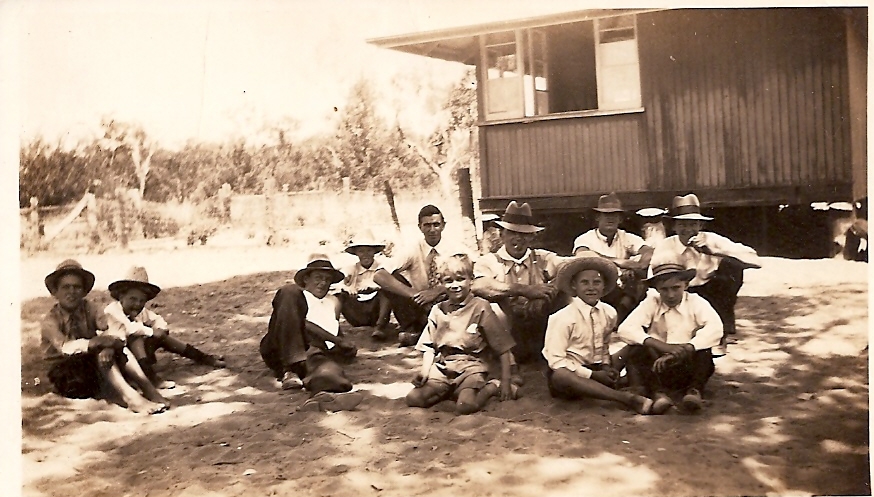
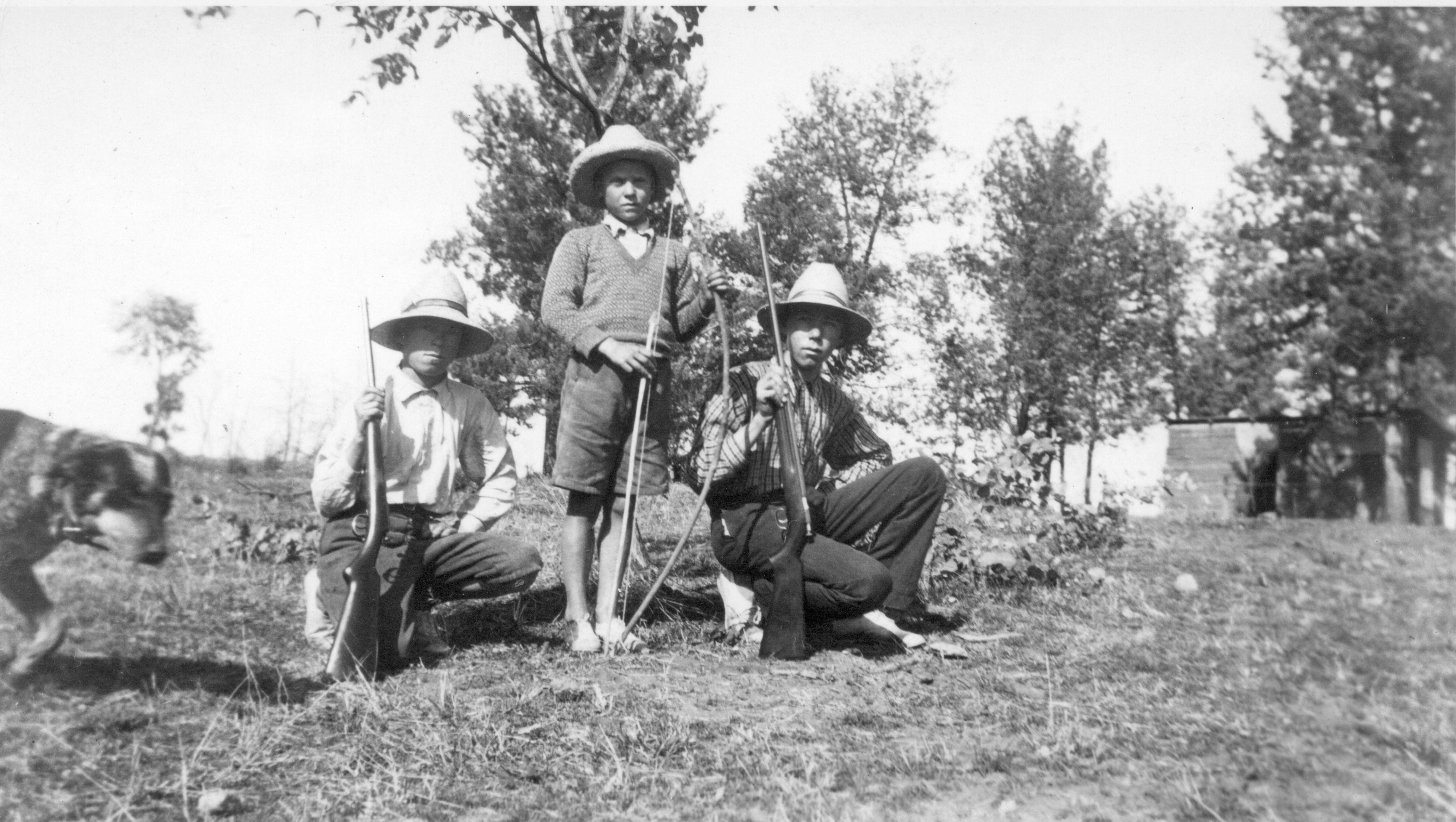
Jim in 2006 at the Nursing Home in Bundaberg with his nephew John. He suffered from emphasemia.
His step daughter Joy took care of him for several years.
He was never far from his special friend four legged Sophie
Sadly Jim died at Easter 2007. He was the last of Katie Jillett's children to pass on.
He is buried at Bundaberg
Dale & Jim at Roma 1927




